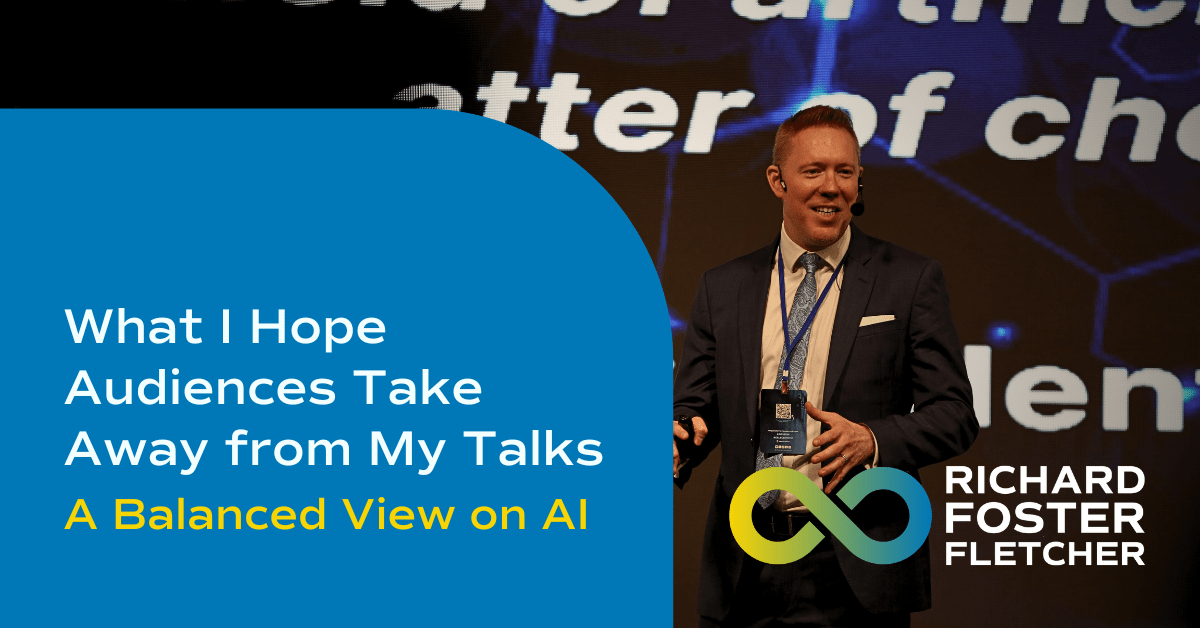
What I Hope Audiences Take Away from My Talks: A Balanced View on AI

When addressing audiences, my primary aim is to inspire cautious optimism about our future with AI. I want people to see the potential for AI to create a better, more equitable world. Recently, during a workshop, I was asked about the impacts of AI, which led me to reflect on our current lifestyles. In the UK, we enjoy many comforts that come at a cost to others around the world, who often endure less favourable conditions to support our way of life.
The Global Opportunity of AI
AI offers a unique opportunity to change this dynamic by improving conditions globally. However, this transformation won’t happen automatically. The benefits of AI, often referred to as the AI dividend, stem from increased productivity and efficiency. These gains must be directed thoughtfully to ensure they benefit society as a whole, not just a privileged few.
Reinvesting AI Gains into Society
For businesses, this means not merely using AI to cut costs and increase profits but reinvesting those gains into areas that enhance the workforce and society. This includes using AI to create new job opportunities, support employee wellness, and drive grassroots innovation. These steps are crucial to avoid exacerbating existing inequalities.
The Risk of Entrenching Inequality
One of the most significant risks is that without proper guidance, the AI dividend will be used to further entrench the wealth and power of a small elite. This could lead to a scenario where the majority of people are marginalised, relying on basic income schemes without meaningful work. Such an outcome would represent a return to a feudal system, with a small number of wealthy individuals controlling the bulk of resources.
Advocating for Equitable AI Policies
To avoid this, we must advocate for policies that ensure the benefits of AI are widely shared. This involves pushing for transparency in AI development, ensuring that AI systems are built and deployed ethically, and holding companies accountable for how they use AI. It’s about recognising that the data and insights that fuel AI come from all of us, and thus the benefits should return to all of us.
Inspiring Action Through Engagement
In my speeches, I hope to leave audiences with the understanding that while AI holds great promise, realising its potential requires active and thoughtful engagement from everyone. We need to foster innovation, support equitable growth, and ensure that the advancements we make in AI technology lead to a better future for all.
Key Questions We Need to Ask
- How can businesses use AI to benefit society broadly?
- Beyond cost-cutting and profit increases, how can AI reinvestment create new job opportunities and support societal growth?
- What measures can ensure AI’s benefits are shared widely?
- How can transparency in AI development and ethical deployment practices prevent the concentration of wealth and power?
- How do we prevent a return to a feudal-like system?
- What policies can ensure meaningful work and equitable resource distribution in the age of AI?
- What role do data and insights play in AI equity?
- How can we ensure that the data contributing to AI advancements benefits all contributors fairly?
- How can we foster a culture of innovation and ethical AI use?
- What steps can be taken at both corporate and societal levels to promote ethical AI practices and support sustainable innovation?
By addressing these questions, we can navigate the complexities of AI integration and create a more equitable, innovative future. The potential of AI to transform society is immense, but it requires a collective effort to ensure these advancements benefit everyone, not just a select few.
















